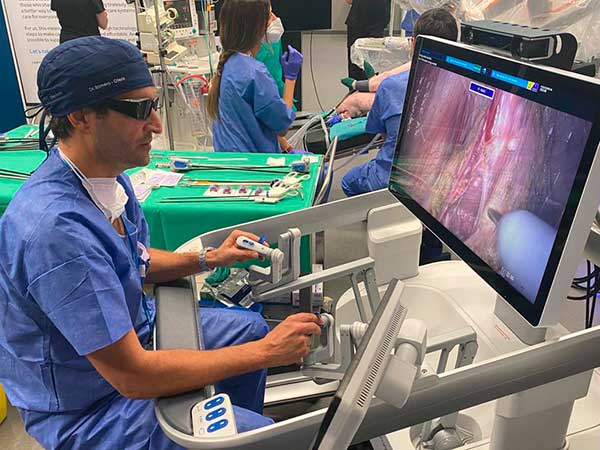Surgery is experiencing an exciting time thanks to the implementation of robotics. Medical and technological advances are allowing us to offer the best treatments to our patients with the least possible disruption to their quality of life.
At ROC Clinic, more than 1,000 patients have already been operated on with the Da Vinci robot (from Intuitive) and more than 70 have been operated on with the Hugo RAS robot (from Medtronic), obtaining excellent results. The addition of Hugo to our therapeutic arsenal in September 2022 has made us one of the few centers in the world to have both robots on the market.
Hugo RAS allows us to control the robot arms individually, using them according to surgical needs for greater range of motion and versatility. In addition, it has an open console that allows us to maintain a constant and direct relationship with the rest of the professionals in the operating room. It also provides high definition vision, enhanced precision and a more ergonomic posture that minimizes the fatigue inherent to surgery.
Hugo also features wrist instruments, 3D visualization and a cloud-based surgical video recording option that allows procedures to be securely recorded and data to be collected for analysis.
Robotic surgery is a minimally invasive, safe and precise procedure that is less traumatic for the patient. Thanks to it, better results are achieved with fewer complications, shorter surgical time, less intraoperative bleeding, shorter hospital stay and faster post-operative recovery.
In Urology, we use this technology to treat prostate cancer, bladder cancer, renal cancer, excision of abdominal lymph nodes in cases of testicular cancer or other retroperitoneal tumors, pelvic organ prolapse or dilatation of the renal pelvis.
Accredited in robotic surgery
The surgeons at ROC Clinic and HM Hospitales who operate with robots have undergone official training programs and have been accredited after completing a minimum number of mandatory training hours to ensure the highest quality, even for very experienced surgeons.
In these trainings, we perform a lot of simulations of all processes and we face critical events and possible material failures in order to know the possible list of robot errors and to be prepared for them.
Having a lot of experience in open surgery or endoscopic surgery, as is our case, helps a lot to get the most out of the robot and shortens the learning curve to become a competent robotic surgeon.
We are also a training center for robotic surgery with programs aimed at national and international urologists, both in our own centers and in the centers of hospitals that request them.

